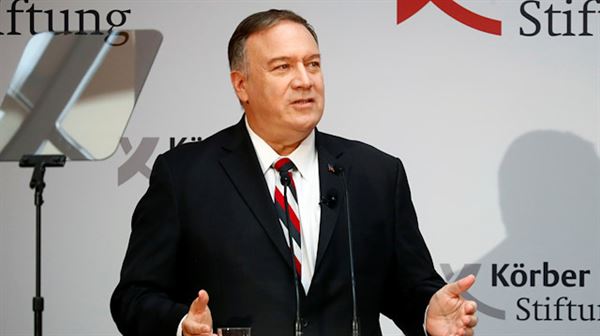U.S. Secretary of State Mike Pompeo on Friday called on European countries to join America’s campaign against its rivals Russia, China, and Iran
U.S. Secretary of State Mike Pompeo on Friday called on European countries to join America’s campaign against its rivals Russia, China, and Iran.
“Those of us who want us to spread freedom must confront those that want to spread their wild ideology, to dominate the free nations of the world,” Pompeo said in a major speech at the Korber Foundation in Germany’s capital.
America’s top diplomat argued that three decades after the fall of the Berlin Wall, liberal freedoms and the international order are again being challenged by the rise of authoritarian regimes.
At home, Pompeo has been accused of involvement in the emerging scandal over pressuring Ukraine to whitewash Russian interference in the 2016 presidential election and investigate Trump’s electoral rivals.
In his speech, Pompeo called on Germany and other European states to take a tougher stance against Russia, China, and Iran, and reduce their energy, economic, and technological dependence on these countries.
“We make a tough case about ensuring that Germany doesn’t become dependent on Russian energy. We don’t want Europe’s energy supplies to be dependent on Vladimir Putin,” he said, repeating Washington’s opposition to the Nord Stream 2 gas pipeline project.
Pompeo also urged the German government to exclude China’s telecom giant Huawei from building its national 5G networks.
“Your own intelligence chief said that Huawei cannot be fully trusted, because it’s subject to the power of the Chinese communist party,” he claimed.
Pompeo accused Iran of destabilizing activities and assassination campaigns in Europe, claims denied by Tehran.
He called on Western countries to up their pressure on Iran over its nuclear program.
The U.S. secretary of state met on Friday with German Chancellor Angela Merkel and Defense Minister Annegret Kramp-Karrenbauer.
He arrived in Germany on Wednesday for a three-day visit to take part in events marking the end of the Cold War and the 30th anniversary of the fall of the Berlin Wall.
